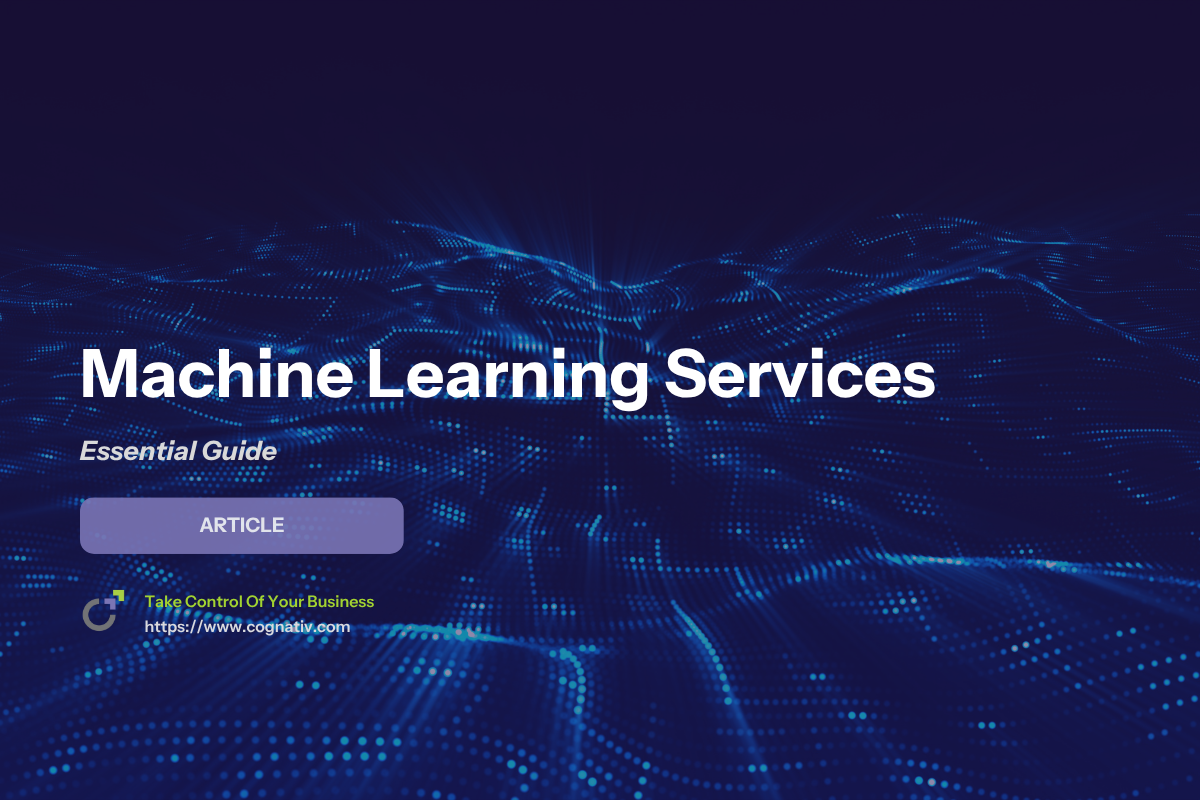Essential Guide to Machine Learning Services: Tools and Applications
As artificial intelligence continues to reshape industries, machine learning has emerged as a foundational component in modern AI strategies. This essential guide covers everything from the fundamentals of machine learning to advanced natural language processing applications, highlighting tools like Azure Machine Learning Studio, development methodologies, and critical services that enable intelligent systems to deliver meaningful business value.
AI solutions are comprehensive and customizable offerings that integrate machine learning services to address specific business objectives and are tailored to the unique business context of each organization.
Key Takeaways
-
Machine learning services encompass model training, development, and deployment using scalable cloud-based tools.
-
ML services help energize business operations, improve productivity, and support continuous model refinement.
-
Natural language processing and deep learning are essential AI components for real-time, human-like interactions.
-
Azure Machine Learning and similar platforms streamline end-to-end ML workflows, enabling enterprises to build robust AI models.
-
Cost reduction is a key benefit of machine learning services, as they optimize operations and lower expenses through real-time data analytics and improved efficiency.
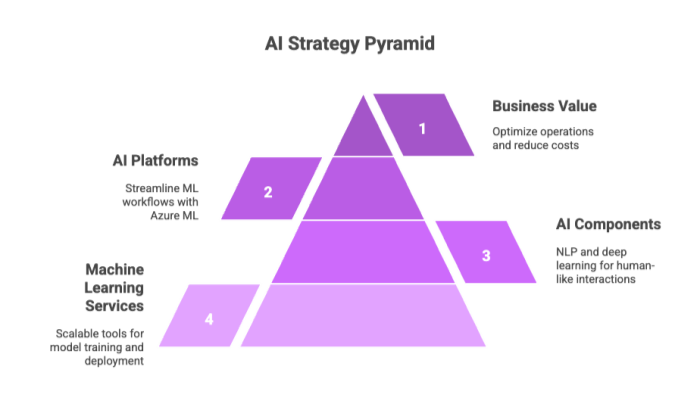

What is Artificial Intelligence?
Artificial intelligence (AI) refers to systems that mimic human cognitive functions such as learning, reasoning, and perception. It combines algorithms, statistical models, and data science to automate decision-making tasks.
AI includes several subfields, with machine learning (ML) being the most widely used. ML empowers systems to learn from data rather than relying on explicitly programmed instructions, improving performance over time.
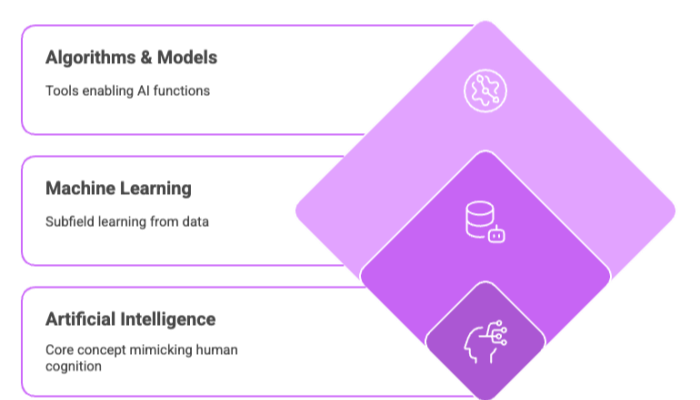

Machine Learning Fundamentals
Machine learning is the engine behind many AI systems today. It involves training machine learning models to recognize patterns, perform classification, or predict outcomes using structured or unstructured data. Machine learning is widely used for applications such as anomaly detection to identify unusual patterns and prevent issues like fraud or equipment failure. These models are typically trained on historical data, which serves as the foundation for forecasting future trends and optimizing strategies.
Key learning paradigms include:
-
Supervised learning: Learns from labeled data.
-
Unsupervised learning: Finds patterns in unlabeled data.
-
Reinforcement learning: Learns optimal actions via feedback loops.
Machine learning addresses a variety of business problems, from demand forecasting to risk management.
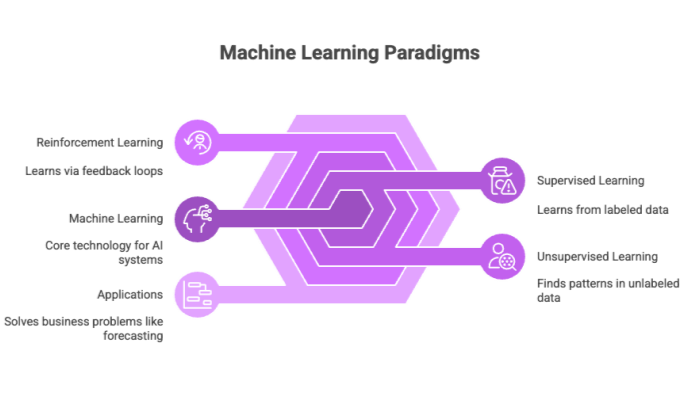

Model Development and Training
Machine learning services provide businesses with powerful tools and solutions to harness data effectively, enabling smarter decision-making and operational efficiency. These services encompass a wide range of capabilities, from model development and training to deployment and ongoing optimization.
Model Development
Model development is a critical phase where data scientists leverage data exploration, algorithm selection, and software engineering to build reliable and performant models. This model building process follows a structured approach to ensure optimal results. Techniques such as feature engineering and cross-validation improve accuracy and generalizability. Domain expertise is crucial for designing an effective ML model tailored to specific industry needs.
Model Training
Model training uses large datasets to tune model parameters. Training robust ML models is essential for real-world deployment, as it ensures the models perform accurately and reliably in production environments. This phase is central to the success of any machine learning project. It includes steps like:
-
Hyperparameter tuning
-
Cross-validation
-
Model performance evaluation
Effective training data improves model robustness, supporting applications from fraud detection to predictive maintenance. To maximize business value, it is crucial to deploy ML models efficiently to production environments, enabling seamless integration and operationalization of machine learning solutions.

Machine Learning Tools and Platforms
Modern machine learning tools provide a full suite of functionalities:
-
TensorFlow and PyTorch for deep learning.
-
Scikit-learn for classic ML algorithms.
-
Azure Machine Learning for end-to-end enterprise model lifecycle management.
These tools support every aspect of the machine learning lifecycle, from data ingestion to model deployment. They also facilitate robust data management for efficient machine learning workflows, ensuring proper data organization, pipelining, and accessibility for data engineers and scientists.
By leveraging these platforms, organizations can accelerate development, improve operational efficiency and data-driven decision-making. Additionally, these tools enable organizations to build ML powered solutions and scalable ML solutions tailored to their specific business needs.
Overview of Machine Learning Tools
Machine learning tools are essential for organizations and data scientists aiming to develop robust machine learning solutions. These software platforms streamline the entire process of building, training, and deploying machine learning models, making advanced analytics accessible even to teams with varying levels of machine learning expertise.
Leading tools such as Azure Machine Learning Studio, Google Cloud Machine Learning, and IBM Watson Machine Learning offer comprehensive environments for data exploration, model development, model training, and model deployment.
These platforms support a wide array of machine learning algorithms, from classic predictive analytics to cutting-edge deep learning and natural language processing. With features like automated data preprocessing, visual data exploration, and integrated model deployment pipelines, machine learning tools empower users to accelerate the development of custom models and deploy machine learning models at scale.
By leveraging these digital transformation frameworks and solutions, organizations can enhance the accuracy of their machine learning models, reduce time-to-market, and drive innovation across business processes.
Azure Machine Learning Studio
Azure Machine Learning Studio is a cloud-based platform offering drag-and-drop functionality and Python SDK integration for robust ML development.
Key features:
-
Prebuilt algorithms and deep learning support.
-
Model training pipelines with MLOps integration.
-
Easy model deployment to Azure cloud infrastructure or edge devices.
-
Data visualization tools that help users analyze and interpret data visually.
Azure also facilitates custom machine learning models, including support for computer vision and natural language applications. Additionally, Azure Machine Learning Studio supports advanced applications such as video analysis for object detection and quality control in manufacturing.
Google Machine Learning
Google Machine Learning provides a powerful suite of cloud-based machine learning tools and services designed to help organizations and data scientists build, train, and deploy machine learning models efficiently. With support for popular frameworks such as TensorFlow and scikit-learn, Google Machine Learning enables seamless model development and integration into existing systems. Its automated machine learning capabilities, including AutoML, allow users to create custom models without requiring deep machine learning expertise, making advanced AI accessible to a broader audience.
The platform also offers a variety of pre-trained models for tasks like image classification, natural language processing, and predictive analytics, enabling rapid prototyping and deployment. By utilizing Google Machine Learning, organizations can accelerate their machine learning projects, improve the performance and accuracy of their models, and significantly reduce operational costs. This flexibility and scalability make Google Machine Learning a preferred choice for businesses seeking to deploy machine learning models and drive digital transformation.
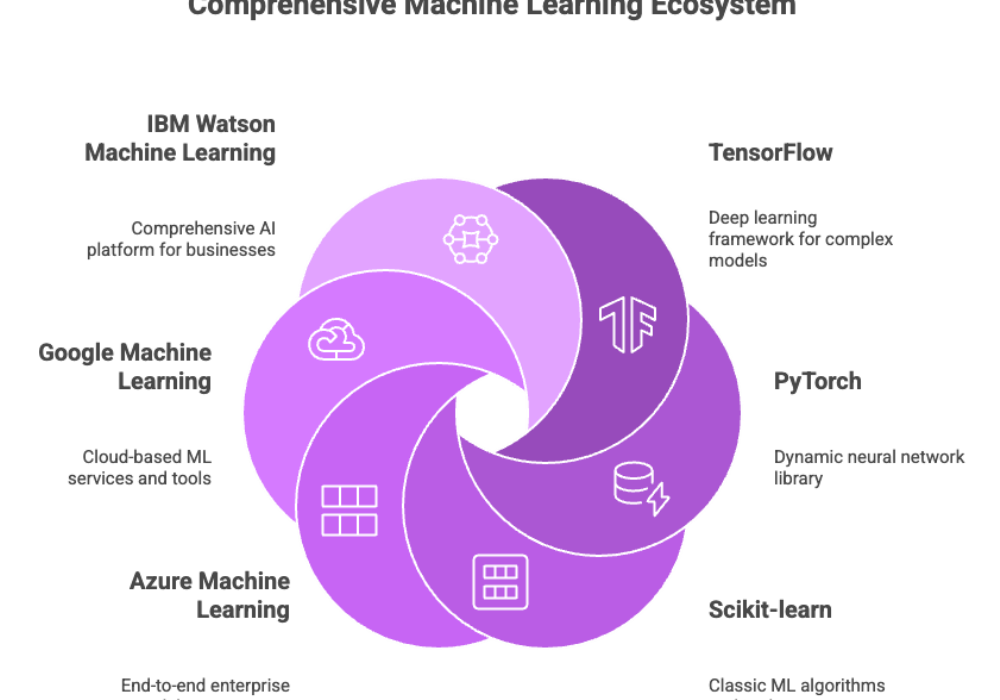

Natural Language Processing
Natural language processing (NLP) bridges the gap between human communication and machine understanding. It’s a pillar of AI services, enabling systems to interpret, analyze, and respond to human language.
NLP tasks include:
-
Text classification
-
Speech recognition
-
Sentiment analysis
Introduction to Natural Language
Natural language is the foundation of human communication, encompassing the words, phrases, and structures we use to convey meaning. In the realm of artificial intelligence, natural language processing (NLP) is a specialized area of machine learning focused on enabling computers to understand, interpret, and generate human language. NLP leverages machine learning models to perform a variety of tasks, including text analysis, sentiment analysis, and language translation.
By training machine learning models on vast datasets of unstructured data, organizations can unlock powerful capabilities such as automated customer service, real-time sentiment analysis, and multilingual support. NLP not only streamlines business processes and enhances operational efficiency but also provides deep insights into customer behavior and preferences. As a result, businesses can make data-driven decisions, improve service quality, and reduce costs by automating complex language-based tasks with advanced natural language processing solutions.
Natural Language Processing Applications
NLP powers many real-world applications:
-
Chatbots and virtual assistants
-
Language translation
-
Text analytics for customer feedback
-
Voice-based user interfaces through speech synthesis and dialogue systems
With machine learning, NLP models can adapt and improve, offering more accurate and human-like interactions.
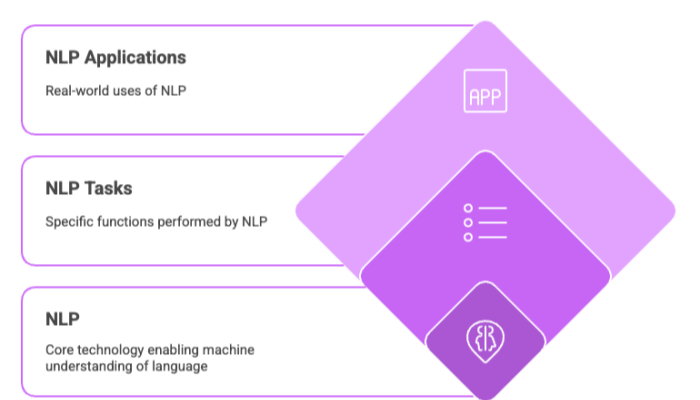

Learning Services and Development
Learning services focus on model optimization through different training paradigms:
-
Supervised learning for labeled outcomes
-
Unsupervised learning for hidden pattern discovery
-
Reinforcement learning for interactive decision making
These services are essential in domains like image classification, speech recognition, autonomous systems, and media platforms. They enable the development of predictive models and deep learning models for a wide range of applications. Additionally, generative AI is becoming increasingly important for creating new content and automating complex tasks.
Development Services
Development services combine data science with engineering to deploy scalable models, emphasizing the importance of data science expertise in building robust, data-driven solutions. They include:
-
Data ingestion and preprocessing
-
Model training and testing
-
Cloud deployment and monitoring
-
The data scientist manages the end-to-end workflow, from data preparation to model deployment and optimization
Modern development services integrate with cloud platforms like Azure and Google Cloud, offering powerful workflows for both research and production-grade ML systems. These services deliver a custom ML solution tailored to specific client requirements, ensuring optimal performance and integration.
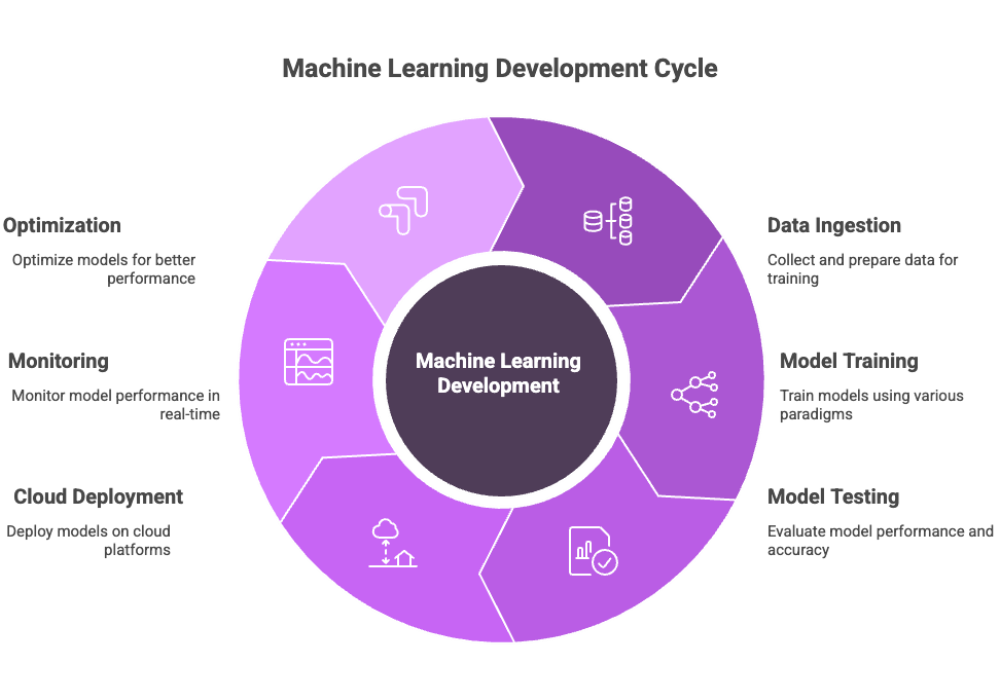

AI Innovation and Journey
The AI journey encompasses the entire lifecycle of implementing AI in an organization:
-
Data collection and preparation, including analysis of user behavior as a key input
-
Model development using ML frameworks
-
Model deployment and monitoring
-
Business integration and continuous learning
This journey requires collaboration across software engineers, data scientists, and business analysts to ensure AI drives tangible outcomes.
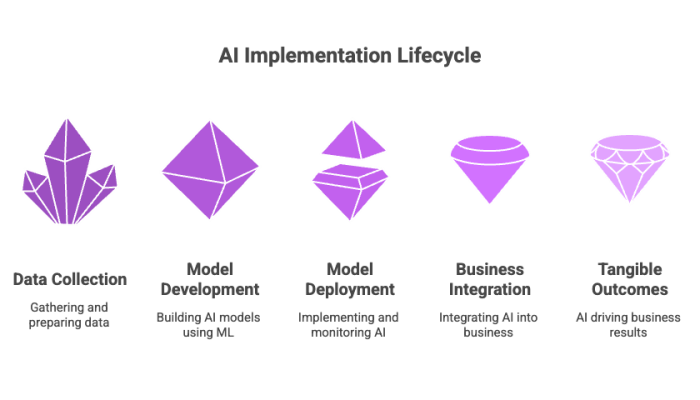

Conclusion
Machine learning services are essential for businesses looking to stay competitive in the age of AI. From model development to natural language processing and cloud-enabled deployment through platforms like Azure Machine Learning Studio, these services form the backbone of intelligent systems.
By investing in scalable learning services, organizations can unlock new levels of efficiency, accuracy, and innovation—transforming how they engage customers, optimize processes, and solve complex problems.

